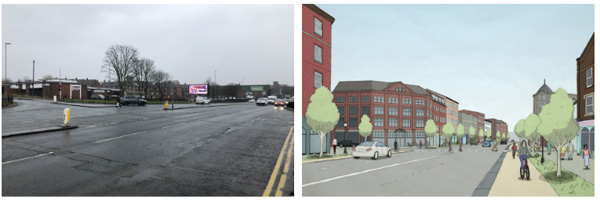Land should be reclaimed from ‘excessively wide road infrastructure’ - dubbed the roadbelt - to build new homes and boost prosperity, a think tank has argued.
A new policy paper from Create Streets, Moving Towards Growth: why it’s time to build on Britain’s Roadbelt, criticises, what it calls a ‘fixation’ on speed, which it says ‘results in a vain attempt to widen junctions and build new roads under a claim of easing congestion’.
The paper argues that creating simpler, ‘human-scale’ streets could be a route to enhanced local productivity and prosperity at a fraction of the price.
In the introduction to the paper, the organisation’s deputy director, David Milner, writes: ‘Specifically, if this thinking were applied to the cities and towns scarred by post-war urban road building, we could create proud boulevards lined with beautiful, sustainably located new homes on space currently given over to needlessly, indeed counter-productively, wide roads.’
The paper urges mayors and councillors to identify and repurpose ‘land-hungry road junctions and excessively wide road infrastructure' in city and town centres and use a portion of the increased number of homes accessible by building onto defunct road space to fund rapid transit services.
It cites a project in Rochdale where removing a turning lane from a ‘five-lane urban motorway’ allowed designers to add a new row of homes, adding up to 400 more homes.

Source: Create Streets
Steve Gooding, director of the RAC Foundation, told Highways that the images (above) in the report showed clear scope for rethinking the space occupied by the junction, ‘assuming that the decision to remove the right-turn filter is based on an assessment of the actual traffic flow’.
Commenting on the ideas raised in the report, he said: ‘While there’s clearly a case for revisiting the layout of some urban roads to bring them into line with the changed priorities reflected in the latest version of the Highway Code, it remains to be seen whether linking that with housing development unlocks the scale of investment that’s currently beyond the reach of our cash-strapped local councils.’
He added: ‘The fashion for urban motorways has long passed, as have the pea-souper fogs and coal-fired smog that made us rebel against the cheek-by-jowl style of our historic city centres and flee to the more spacious suburbs.
‘With the good progress that’s being made to give us cleaner, healthier air there’s also an appetite for denser development.
'Places like Poundbury showcase what can be achieved, but also teach us that grand visions need to be backed up by meticulous planning and adequate funding if they are to be turned into a liveable reality where our shops are well-stocked, our kids can get to school, and our home deliveries arrive when we expect them.’





